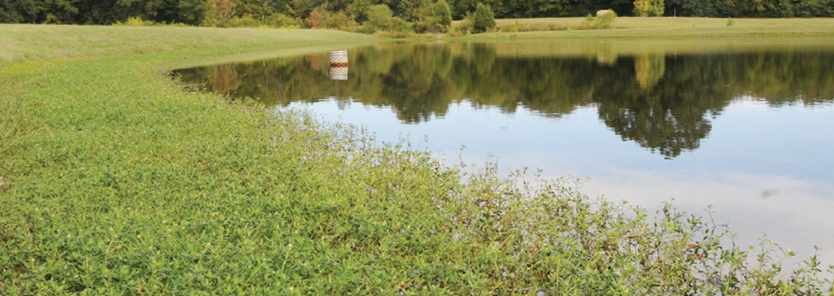Alternanthera phyloxoides, also known as Alligator weed, is an exotic plant from South America that is classified as an invasive weed in the United States. It is also listed as an invasive species in Australia, New Zealand, China and Thailand. It is thought to have first entered the U.S. in ballasts from ships coming from South America. It is found in all of the coastal states- – from Virginia to Texas. More than 80 percent of the water in Florida is infested with alligator weed.
Alligator weed typically grows at the edge of the water, amiths a thick mat of stems and long pointed leaves. The mat may extend outward into the pond 10 feet or more. It is not uncommon to see these mats break loose from the shoreline and float as islands in the pond. The mats provide excellent habitat for breeding mosquitoes and also for various species of water snakes. These thick mats can impede the use of boats in narrow sloughs and canals and also make it difficult to fish the pond from the bank.
Identifying Alligator Weed
Although the leaves may have many different shapes, they are most often 3 to 5 inches long, narrow and pointed. Two leaves are usually arranged directly across from each other at the node of the stem, thus the leaves are termed opposite. The leaves have a typically smooth margin and a distinct mid-rib. During the summer, the plant is also recognized by a small white flower that forms at the end of a stem. Another plant that is often confused with alligator weed is prim-rose, but it has a yellow flower. The stem of alligator weed is thick and hollow and is usually green to reddish-purple in color. The stem may be upright, but in many of the inter-woven mats it may grow parallel to the water.
Biological Control
Alligator weed has a number of natural enemies in its native South America. During the mid-1960s the alligator weed beetle was successfully imported to control infestations of alligator weed in Florida. Two other insects, thrips and stem borers, were also imported and used in combination to control large infestations of alligator weed. The pro-gram was so successful that spraying of herbicides was greatly reduced.
Grass carp are another biological control for many submersed weeds, but are not effective in controlling alligator weed.
Chemical Control
Most pond and lake situations are too small to warrant biological control methods, but herbicides are often effective in control-ling alligator weed. Approved herbicides will often have to be applied more than once a year to achieve control. The two most common herbicides for alligator-weed control are: an aquatic glyphosate (such as Rodeo) or 2,4-D amine. There are many trade names for these herbicides.
Application rates are on the label for each of the herbicides and should be followed as per directions. Most of the generic herbicides are best applied with a recommended surfactant, to help the herbicide stick to the plant. As a general rule, a gallon of approved herbicide mixed with 50 gallons of water will cover an acre of alligator weed. It will usually take about a week or 10 days to notice the yellowing of the plant. In about three weeks the plant will be brown and decaying. Because the stems are thick, the decay process may be slow and take several weeks to complete. If the plants are in a narrow band around the pond, the entire perimeter may be sprayed without danger of oxygen depletion. However, if there are large areas of mats, it is often best to treat a third of the area each week.
Alligator weed is much easier to control when it is treated during the early stages of its growth. Some of the older established plants are more resistant to herbicides. It is much easier to provide good control before large mats are formed or entire sloughs are choked with the weed.
Be prepared to re-treat areas approximately four to six weeks after the initial herbicide application. Persistence is the key to good control.









